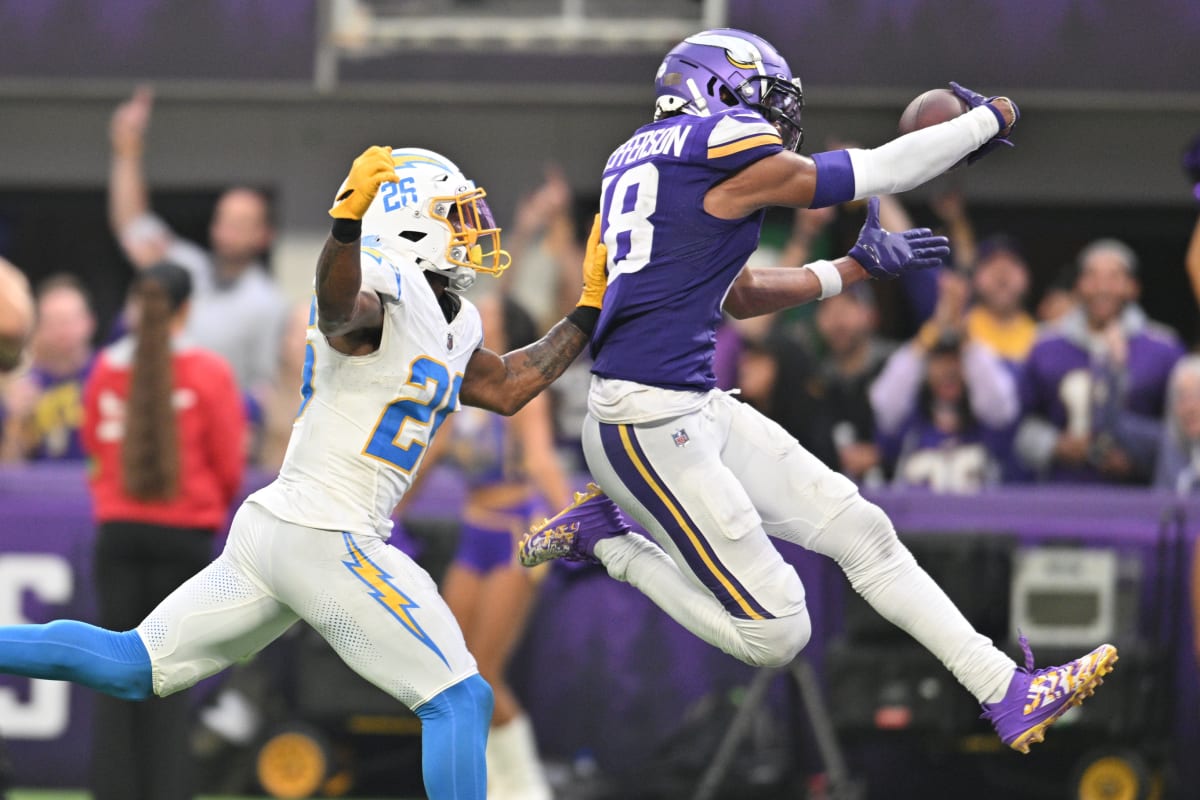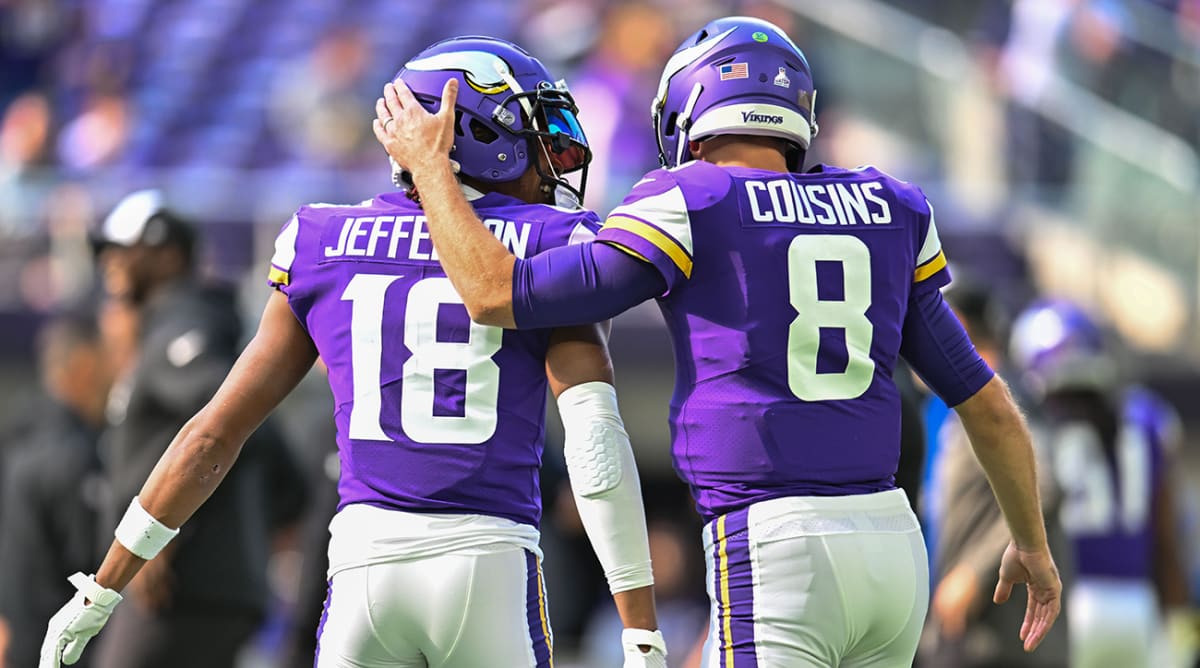The most important nonquarterback offensive player in pro football didn’t snag his first touchdown reception until Week 3, which can seem like a crime against humanity but also underscores a larger and more relevant point.
The basics: The Vikings hosted the Chargers on Sunday, in a game between teams that most believed were better than their respective 0–2 records suggested to the masses.
The touchdown: close game, fourth quarter, Vikings offense driving, down 21–17. Minnesota snapped the ball two yards from midfield, with 11:30 on the game clock and four wideouts bunched close to the line, with two on each side, both stacked.

Jeffrey Becker/USA TODAY Sports
At that point—remember this for later—Vikings quarterback Kirk Cousins was 23 of 35 for 252 yards and two touchdowns. He had played that well, it should be noted, with nearly a full quarter to go—and against a team led by a coach in Brandon Staley who’s known for defensive acumen, if not his in-game clock management.
Jefferson lined up inside another wideout, sprinted off the snap and cut more inside on a crossing route. There were two defenders nearby, but Cousins deployed a long windup to send the ball toward his favorite target in a hurry. Jefferson caught the pass in stride, flying past one defender and cut even more to the middle to force the other would-be tackler to dive, the attempt futile, all air. He then cut up field, galloping toward the end zone, outracing two other defenders pursuing at angles from both sides behind him. One did nearly reach him—but only after Jefferson added an ill-advised flourish to his dash and skipped through the final few yards. The sequence gave the Vikings a 24–21 lead.
It was the kind of catch that demands viewers’ attention, greatness confined to a few seconds of amazement shown on TV. That kind of catch separates Jefferson not from above-average or even great receivers. That kind of catch separates him from all the rest of them. It’s the kind of grab that saves a season. Until—on this day, for this catch—it didn’t save anything.
Hence the relevant takeaway, in sequence, that (1) Jefferson is amazing, the best receiver, among many elite wideouts, on the planet at present. But (2) in this of close defeats, his talents are not enough, which (3) leads most of America to blame Cousins, (4) unfairly, but (5) perhaps could limit Jefferson’s top-end-win potential, anyway, for a generational talent tabbed that way without an ounce of hyperbole required.
Here’s the issue: Cousins played well, for the most part. Jefferson showed out, in every which way, finishing Week 3 with seven catches, 149 receiving yards and that first touchdown of the season. The Chargers still won the game, though, 28–24. It would be difficult to pin even the majority of this loss on Cousins. Minnesota promptly allowed Justin Herbert and the Chargers to drive 75 yards in seven plays to regain the lead. And, while holding a Herbert-led offense to 28 points isn’t exactly terrible, the issue that percolates and gathers momentum weekly starts with … there was plenty of time left.
When Minnesota took over after losing the lead that Jefferson and Cousins had given them, the game clock read 8:04. Cousins marched the Vikings down the field, slowly and methodically, which seemed like the right strategy at the time. An unnecessary roughness penalty assessed to a Chargers defender helped. But on a first-and-goal series that started at the Los Angeles 3-yard-line, the Vikings turned the ball over on downs. Two unimaginative runs. Two Cousins incompletions, both with Jefferson as the intended target. Which signaled a familiar feeling, especially to those who live in or outside the Twin Cities and take their morning coffee with Skol chants swirled in.
What did everything in this season, that game and especially the sequence that started with Jefferson’s touchdown signify—on near and short horizons—in short- or long-term senses?
A lot.
Start with where Jefferson stacks historically. This is critically important to the calculus at hand, because it separates something every NFL franchise must consider—how to maximize talents that extend beyond elite before they fade. The wideout entered Week 3 with 309 receiving yards in his first two games and a realistic chance of breaking Wes Welker’s NFL mark of the most receiving yards in three games to start an NFL season (458). His yardage tallies the first two weeks—150 in Week 1, 159 in Week 2—earned him 10 games of at least 150 receiving yards in his first four seasons, tied with Lance Alworth for the most ever, with 15 games remaining in 2023. He also matched Alworth for the historical wideout who most quickly surpassed 5,000 receiving yards. Both did that in 52 games.
Had Jefferson hit 150 again, he would have become the first NFL player to start an NFL season with three consecutive receiving gems at 150 yards or more. He fell three measly feet short, but a statistical correction is always possible, if not likely. The yardage he did amass still tied Jefferson with Welker for the most receiving yards in Weeks 1–3 of any one season.
Where the Vikings franchise is at matters, especially in relation to how well, how early, Jefferson morphed into a unicorn-level threat. Last week, the NFL trumpeted the number of close games and comebacks that had been unfolding across the league. “Games are closer than they’ve been in 91 years,” read one release. While ignoring the likelihood that this has been trumpeted many, many years before, the data on teams that win close games making the playoffs—an obvious notion where the obviousness doesn’t detract from the point—is telling. And, since the NFL expanded the postseason bracket in 2020, all but one team that won at least two-thirds of its close games (defined, by the league, as decided by eight points or fewer) made the playoffs.
Last season, Minnesota was one of those teams. The Vikings won the NFC North, finished 13–4 and notched 11 victories that fit within the league’s definition. They went 11–0 in “close games.” This season, Minnesota has started 0–3, which doesn’t mean the Vikings will for sure miss the postseason but dropped their odds to under 3% at most sportsbooks. Those three losses, it should be noted, came by … three points (Buccaneers) … six points (Eagles) … and four points (Chargers). All of which is to say that anyone deploying Minnesota’s stated goal of a “competitive rebuild” as fodder for laughter or same-old Vikings jokes might want to check the definition of competitive.
Those Vikings were competitive, not dominant, not scary-good, throughout last season. These Vikings are competitive, not bad, not in the neighborhood of demanding a full makeover through on-field play alone, so far throughout this season. That many close games is the embodiment of competitive. Minnesota wasn’t competitive last year compared to this one just because it won those games. The being close part is what matters.
And, yet, Jefferson, fairly, told this to reporters who gathered around him Sunday. “I’m a competitor; I hate losing at the end of the day. Ever since I was a little kid, I just hate the feeling of losing, whether it’s football or a board game. It’s always that competitive spirit in me. … To come up short three times in a row is tough.”
Anyone who loves the color purple must have winced when Jefferson said that. Even the reasonable ones should feel that, because they know that he’s not wrong. They also know he’s too good, too special, too transformative in an era-defining sense, not to mention while playing in an era defined across sports, but more and more in the NFL in recent offseasons, for player movement dictated by the most talented players in the league. Jefferson has that kind of leverage. He’s too skilled to carry a franchise in perpetuity through a slate of close wins or losses.
The most important question in what’s left of this Vikings season centers on his future, more than anything—or anyone—else. Can the Vikings ascend back toward contention? The vote here: maybe. Why? Talented executives and coaches with plenty to build around, Jefferson most notably. But, how quickly can that happen? That’s the question that matters, now, soon, next spring and however long this ostensibly happy-but marriage lasts in Minnesota. No one should expect Jefferson to embrace a role as the NFL equivalent of Mike Trout—transcendent greatness realized in obscurity and buried under losing season after losing season.
The Vikings, to be clear, are not that. Not yet. Not even close. But how many breathing routines started when Jefferson went out of Sunday’s game with an undisclosed injury that turned out to be no more than typical cramping born from superhuman feats? I’d argue that most of the general NFL public is too hard on Cousins. He was, is and will be forever remembered as one of the most precise, accurate, sniper-like quarterbacks in NFL history. Yeah, I said it. It’s true. And it’s true within a generation where accuracy mattered more than ever, where accuracy like his accuracy changed offensive football. Cousins is also one of the best play-action signal-callers in the game. There’s plenty not to like there but to love.

Jeffrey Becker/USA TODAY Sports
And, yet, those of us who have been labeled Cousins Deniers or Cousins Apologists must also concede that, even if we place Cousins in the second tier of any NFL quarterback-ranking system, right below the best of the absolute best, there’s just something about watching him play that … doesn’t inspire confidence. In the Vikings’ three losses this season, Cousins became only the fifth NFL QB ever to notch at least 325 passing yards and two touchdown passes in each of the season’s first three weeks. He has undoubtedly produced huge moments in big games. But there’s just a lack of certainty that washes over professional football aficionados when, like against the Chargers, Cousins gets the ball, game on the line, season nearly over before it really started. Did the drive down the field show his capability to shut up all the skeptics? Yes. Did Minnesota’s inability to score there add firewood to their blazing criticism? Yes. Both answers are true.
What does Jefferson believe? Let’s not twist his public comments Sunday into shots at Cousins, who has taken plenty of those from teammates in and after recent seasons. I listened to what Jefferson said and heard a young prodigy of sorts, someone who overtook all but his own internal expectations in just over three NFL seasons, who knows he led the league in receiving yards last year and who knows where he ranks all time in receiving yards per game (hint: nobody higher). I also heard a superstar who’s only 24 but can sense a fumbling of his prime window, whether subconsciously or more overtly, who wants not just statistics that stagger but also wins that add meaning and purpose to the pursuit of a violent and fluid game. He didn’t sound like someone who’s ready to wait. He shouldn’t be. He shouldn’t have to.
The Vikings should do all they can to make him happy over the final 15 weeks of the 2023 season. Whether they should re-sign Cousins will be revealed more clearly in that stretch. As will whether they can win football games without relying on Cousins and Jefferson as much as they have in recent weeks. That’s where the real concern lies. Scratch out Minnesota’s victory in its regular-season ’22 finale over lowly Chicago, and the Vikings have lost the past five games that mattered against even semiquality opposition. They’re 5–7 in their last 12 contests, Chicago included. That doesn’t make them noncompetitive. But it’s certainly cause for legitimate concern.







